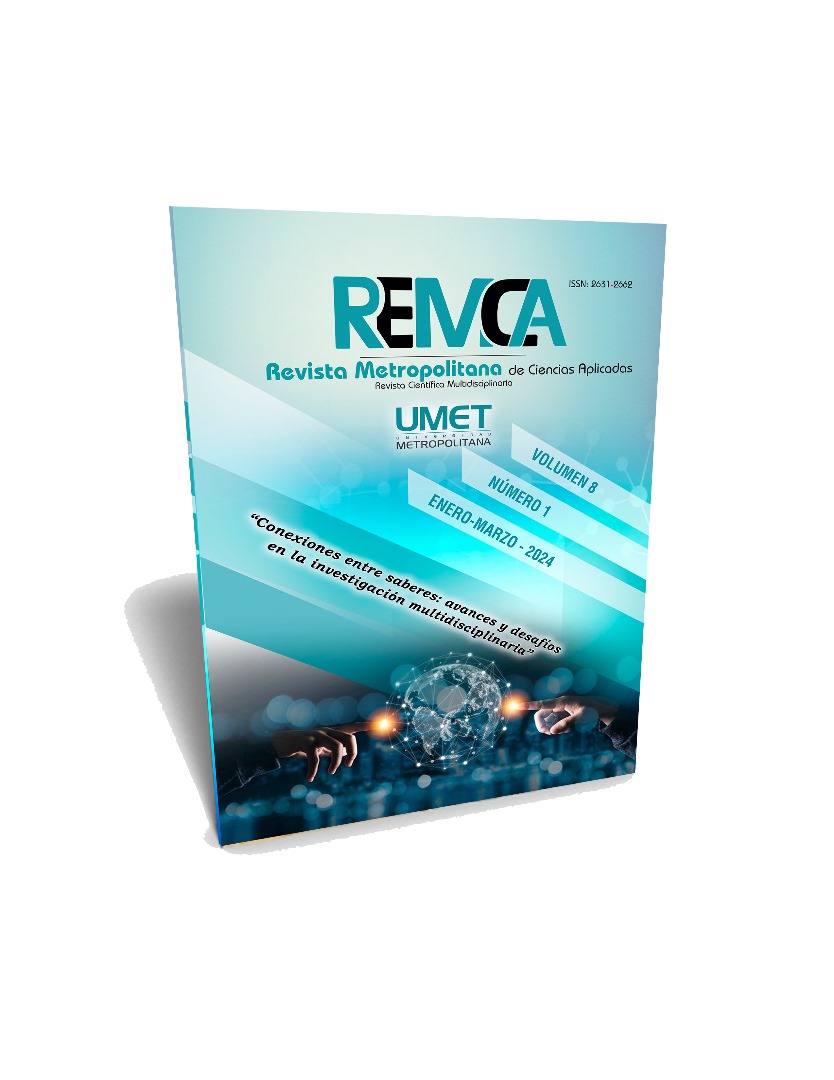Therapeutic efficacy of dissociative anesthetics in depression
DOI:
https://doi.org/10.62452/3npbgn67Keywords:
Dissociative anesthetics, depression, therapeutic efficacy, mental healthAbstract
Depression is a prevalent mental disorder that significantly affects the quality of life despite the existence of conventional treatments, a large proportion of patients do not respond adequately to these, the use of dissociative drugs for the treatment of depression has gained attention. in recent years, especially with the use of ketamine. This anesthetic has been used clinically for decades and has demonstrated rapid and significant antidepressant properties, especially in patients with resistant depression. This is a review of the literature that analyzes the therapeutic efficacy of dissociative anesthetics, such as ketamine. Using databases such as Pubmed, Scopus and Google Scholar, the articles were filtered using inclusion and exclusion criteria. Research reveals that these medications offer a promising alternative for refractory patients, contributing to a rapid and positive response compared to traditional antidepressants. Dissociative anesthetics represent a viable option in the therapy of depression, especially in contexts where conventional treatments have failed, highlighting the need for specialized training in these drugs due to the need for follow-up and adequate monitoring in the patient due to the adverse effects of its administration, in addition to its availability in mental health clinics.
Downloads
References
American Psychiatric Association. (2022). Diagnostic and statistical manual of mental disorders. American Psychiatric Publishing.
Carboni, E., Carta, A. R., Carboni, E., & Novelli, A. (2021). Repurposing Ketamine in Depression and Related Disorders: Can This Enigmatic Drug Achieve Success? Frontiers in neuroscience, 15. https://doi.org/10.3389/fnins.2021.657714
Castro, M., Wilkinson, S. T., Al Jurdi, R. K., Petrillo, M. P., Zaki, N., Borentain, S., Fu, D., Turkoz, I., Sun, L., Brown, B., & Cabrera, P. (2023). Efficacy and Safety of Esketamine Nasal Spray in Patients with Treatment Resistant Depression Who Completed a Second Induction Period: Analysis of the Ongoing SUSTAIN, 37(8), 715-723. https://doi.org/10.1007/s40263-023-01026-3
Chaudhri, S. I., Amin, A., Panjiyar, B. K., Al-Taie, D. S., AlEdani, E. M., Gurramkonda, J., & Hamid, P. (2024). A Comparison of the Efficacy and Adverse Effects of Ketamine and Electroconvulsive Therapy in the Management of Treatment-Resistant Depression: A Systematic Review. Cureus, 16(3). https://doi.org/10.7759/cureus.55596
Dwyer, J. B., Landeros-Weisenberger, A., Johnson, J. A., Londono Tobon, A., Flores, J. M., Nasir, M., Couloures, K., Sanacora, G., & Bloch, M. H. (2021). Efficacy of Intravenous Ketamine in Adolescent Treatment-Resistant Depression: A Randomized Midazolam-Controlled Trial. The American journal of psychiatry, 178(4), 352–362. https://doi.org/10.1176/appi.ajp.2020.20010018
Ecuador. Ministerio de Salud Pública. (2023). Comunicamos. https://www.salud.gob.ec/este-7-de-abril-se-celebra-el-dia-mundial-de-la-salud-con-el-tema-depresion-hablemos/
Erazo, R. (2020). Depresión e inflamación: ¿Una relación más allá del azar?. Revista Médica Clínica las Condes. 31(2). 188-96. https://doi.org/10.1016/j.rmclc.2020.02.006
Garza Sánchez, R.I., González-Tovar, J., & Reyna-Tejada, C.Y. (2022). Sintomatología de estrés, ansiedad y depresión en grupos vulnerables en México durante la pandemia del COVID-19. Informes psicológicos, 24(1), 22-36. https://doi.org/10.18566/infpsic.v24n1a02
Gutiérrez, J., & García García, P. (2024). La base genética de los trastornos depresivos. Ambiociencias: (21), 27–38. https://doi.org/10.18002/ambioc.i21.8180
Hess, E. M., Riggs, L. M., Michaelides, M., & Gould, T. D. (2022). Mechanisms of ketamine and its metabolites as antidepressants. Biochemical pharmacology, 197. https://doi.org/10.1016/j.bcp.2021.114892
Hochschild, A., Grunebaum, M. F., & Mann, J. J. (2021). The rapid anti-suicidal ideation effect of ketamine: A systematic review. Preventive medicine, 152. https://doi.org/10.1016/j.ypmed.2021.106524
Kim, J-W., Suzuki, K., Kavalali, E.T., & Monteggia, L.M. (2024). Ketamine: Mechanisms and relevance to treatment of depression. Annual review of Medicine. 75. 129-43. https://doi.org/10.1146/annurev-med-051322-120608
Kovacova, V., Macejova, A., Tonhajzerova, I., Visnovcova, Z., Ferencova, N., Mlyncekova, Z., Kukucka, T., Farsky, I., Nosal, S., & Ondrejka, I. (2024). Effect of Acute Ketamine Treatment on Sympathetic Regulation Indexed by Electrodermal Activity in Adolescent Major Depression. Pharmaceuticals, 17(3). https://10.3390/ph17030358
Liu, X., Xue, Z., Luo, M., Ke, B., & Lv, J. (2024). Anesthetic drug discovery with computer-aided drug design and machine learning. Anesthesiology and Perioperative Science, 2(7). https://doi.org/10.1007/s44254-023-00047-x
Medeiros, G. C., Gould, T. D., Prueitt, W. L., Nanavati, J., Grunebaum, M. F., Farber, N. B., Singh, B., Selvaraj, S., Machado-Vieira, R., Achtyes, E., Parikh, S., Frye, M., Zarate, C., & Goes, F. (2022). Blood-based biomarkers of antidepressant response to ketamine and esketamine: A systematic review and meta-analysis. Mol Psychiatry, 27(9), 3658-3669. https://10.1038/s41380-022-01652-1
Shiroma, P.R., Thuras, P., Wels, J., Albott, C. S., Erbes, C., Tye, S., & Lim, K. (2020). A randomized, double-blind, active placebo-controlled study of efficacy, safety, and durability of repeated vs single subanesthetic ketamine for treatment-resistant depression. Transl Psychiatry, 10(1). https://doi.org/10.1038/s41398-020-00897-0
Tasé Martínez, M. J., Cajilema Ávila, A. P., & Garzón Zabala, A. E. (2023). Prevalencia y factores asociados a la depresión en jóvenes universitarios en Macas, Ecuador. Revista Ecuatoriana De Psicología, 6(16). https://doi.org/10.33996/repsi.v6i16.103
Tesoro Cruz, E., Rojas Osornio, S.A., & Bekker Méndez, V.C. (2021). Serotonina, depresión y suicidio. Rev. Ciencia: 42(2). 72-81. https://www.amc.edu.mx/revistaciencia/images/revista/72_2/PDF/03_72_2_1302.pdf
Tian, H., Hu, Z., Xu, J., & Wang, C. (2022). The molecular pathophysiology of depression and the new therapeutics. Medcomm, 3(3). https://doi.org/10.1002/mco2.156
Viñuales Chueca, B. (2022). La depresión y los estilos de vida saludable. Rev. NPunto, 5(54). 54-79. https://www.npunto.es/content/src/pdf-articulo/6336bdd442884art2-2.pdf
Walsh, Z., Mollaahmetoglu, O. M., Rootman, J., Golsof, S., Keeler, J., Marsh, B., Nutt, D. J., & Morgan, C. J. A. (2021). Ketamine for the treatment of mental health and substance use disorders: comprehensive systematic review. BJPsych open, 8(1). https://doi.org/10.1192/bjo.2021.1061
Wang, E., Mathi, D.S., Gukasyan, N., Nayak, S. & Garcia-Romeu, A. (2024). Knowledge, attitudes, and concerns about psilocybin and MDMA as novel therapies among U.S. healthcare professionals. 14. Sci Rep. 14(1). https://doi.org/10.1038/s41598-024-78736-1
World Health Organization. (2023). Depression GBD results Institute for Health Metrics and Evaluation. https://www.who.int/news-room/fact-sheets/detail/depression
Yusvisaret Palmer, L., Palmer Morales, S., Medina Ramirez, M. C., & López Palmer, D. A. (2021). Prevalencia de depresión durante la COVID-19 en estudiantes de medicina de una universidad privada mexicana. Medisan, 25(3), 637–646. http://scielo.sld.cu/scielo.php?script=sci_arttext&pid=S1029-30192021000300637&lng=es&tlng=es
Downloads
Published
Issue
Section
License
Copyright (c) 2025 Revista Metropolitana de Ciencias Aplicadas

This work is licensed under a Creative Commons Attribution-NonCommercial-ShareAlike 4.0 International License.
© Podrá reproducirse, de forma parcial o total, el contenido de esta publicación, siempre que se haga de forma literal y se mencione la fuente.


